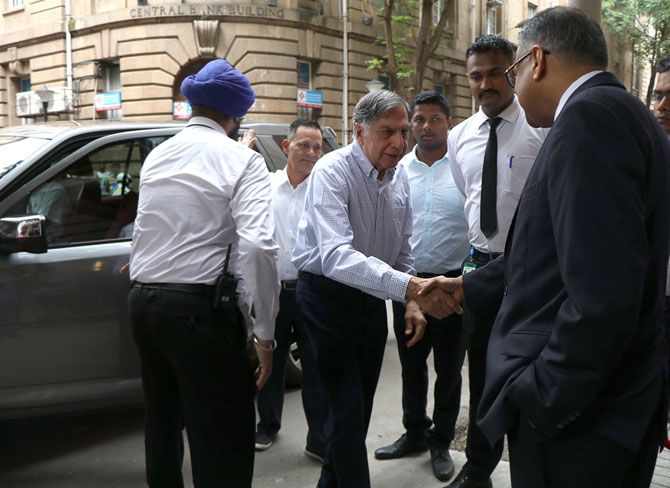From disbursing Rs 25.11 crore to political parties in 2014-2015, the Tata group is learnt to have contributed about Rs 600 crore towards the 2019 Lok Sabha elections.
Archis Mohan and Nivedita Mookerji report.

The Tata group, through its electoral trust, is learnt to have contributed Rs between Rs 500 crore to Rs 600 crore (Rs 5 billion to Rs 6 billion) towards the 2019 Lok Sabha election, pushing up its poll expenditure by more than 20 times since 2014.
In the financial year 2014-2015, it disbursed Rs 25.11 crore (Rs 251.1 million) to political parties, according to official filings made by Progressive Electoral Trust, the Tata group's election funding vehicle.
For the ongoing election, it has made contributions to all national parties, with the biggest chunk going to the Bharatiya Janata Party.
The electoral trust distributes the contribution proportionately to the registered national political parties on the basis of the seats held by them in Parliament.
The Tata group did not respond to queries on the matter.
Estimates available from various political parties suggest that the BJP got between Rs 300 crore and Rs 350 crore (Rs 3 billion and Rs 3.5 billion) out of the total funding by the Tatas in 2019.
The Congress possibly received in the region of Rs 50 crore (Rs 500 million). The remaining sum was divided between the Trinamool Congress, Communist Party of India, Communist Party of India-Marxist or CPI-M, and Nationalist Congress Party.
Of the total contributions made by the group for this election, around Rs 220 crore (Rs 2.2 billion) came from Tata Consultancy Services, the software major said in its post-result analyst call recently.
In the financial year 2014-2015, TCS had contributed only Rs 1.48 crore (Rs 14.8 million) to Progressive Electoral Trust. Tata Steel had paid a much higher amount at Rs 14.13 crore (Rs 141.3 million), while parent company Tata Sons's contribution was Rs 4.74 crore (Rs 47.4 million), Tata Motors's Rs 1.84 crore (Rs 18.4 million), Tata Chemicals's Rs 1.49 crore (Rs 14.9 million), Tata Global Beverages's Rs 1.23 crore (Rs 12.3 million), and Tata Power's Rs 14.47 lakh (Rs 1.447 million), among others, five years ago.
Sources pointed out that the Tata group's election funding has risen significantly quite in sync with the increase in the country's election expenditure.
Another major change this election is the way the salt-to-software conglomerate is funding political parties. So far, half of the contributions from Progressive Electoral Trust were being distributed to political parties prior to the elections and the other half after the elections, according to the Articles of Association available with the Registrar of Companies.
This was altered end of 2018, as sought by political parties.
'Depending on the timing of the relevant election, distribution of the distributable contribution in two phases as currently set out in Article 10 may not be possible,' the Trust said in a notice to an extraordinary general meeting, according to a filing with the RoC in December 2018.
'Also, Tata Sons, a member of the company (the electoral trust), has received requests from political parties to provide the entire contribution prior to the election, so as to enable them to utilise the money for the purpose of elections.'
'Accordingly, Tata Sons, vide its letter dated November 16, 2018, to the company (the electoral trust) has proposed to amend the Articles of Association of the company, pursuant to the requests from political parties and in order to eliminate the possibility of any conflict with the income-tax rules,' it added in its notice for a special resolution.
In the case of the earlier arrangement of the electoral trust contributing half the fund before elections and another half later, the winning party stood to benefit if there was a change in government after the polls.
With the changed rules, the entire funding has to be given before the election, thereby benefiting the ruling political party the most. In the current Lok Sabha, the BJP has 268 seats, the Congress 45, the TMC 33, the CPI-M 9, the NCP 7, and the CPI 1.
While electoral trusts were introduced before the previous Lok Sabha election for ensuring transparency in funding, electoral bonds have turned out to be more attractive for the corporate world in 2019. The identity of the donor is kept confidential while contributing through electoral bonds unlike electoral trusts.
In fact, from 2014 to 2019, the number of electoral trusts has grown from 20 to just about 30, according to an official in the ministry of corporate affairs.
"My sense is that the growth in trusts is relatively limited because corporates would, by and large, prefer to give anonymously," says Milan Vaishnav, director and Senior Fellow, South Asia Program, Carnegie Endowment for International Peace.
While Vaishnav pointed out that it is nearly impossible to gauge how much corporates are spending in 2019, he said, "The conventional wisdom is that the overall election spending this year will probably hit $7 billion to $8 billion, which is up from an estimated $5 billion in 2014."











